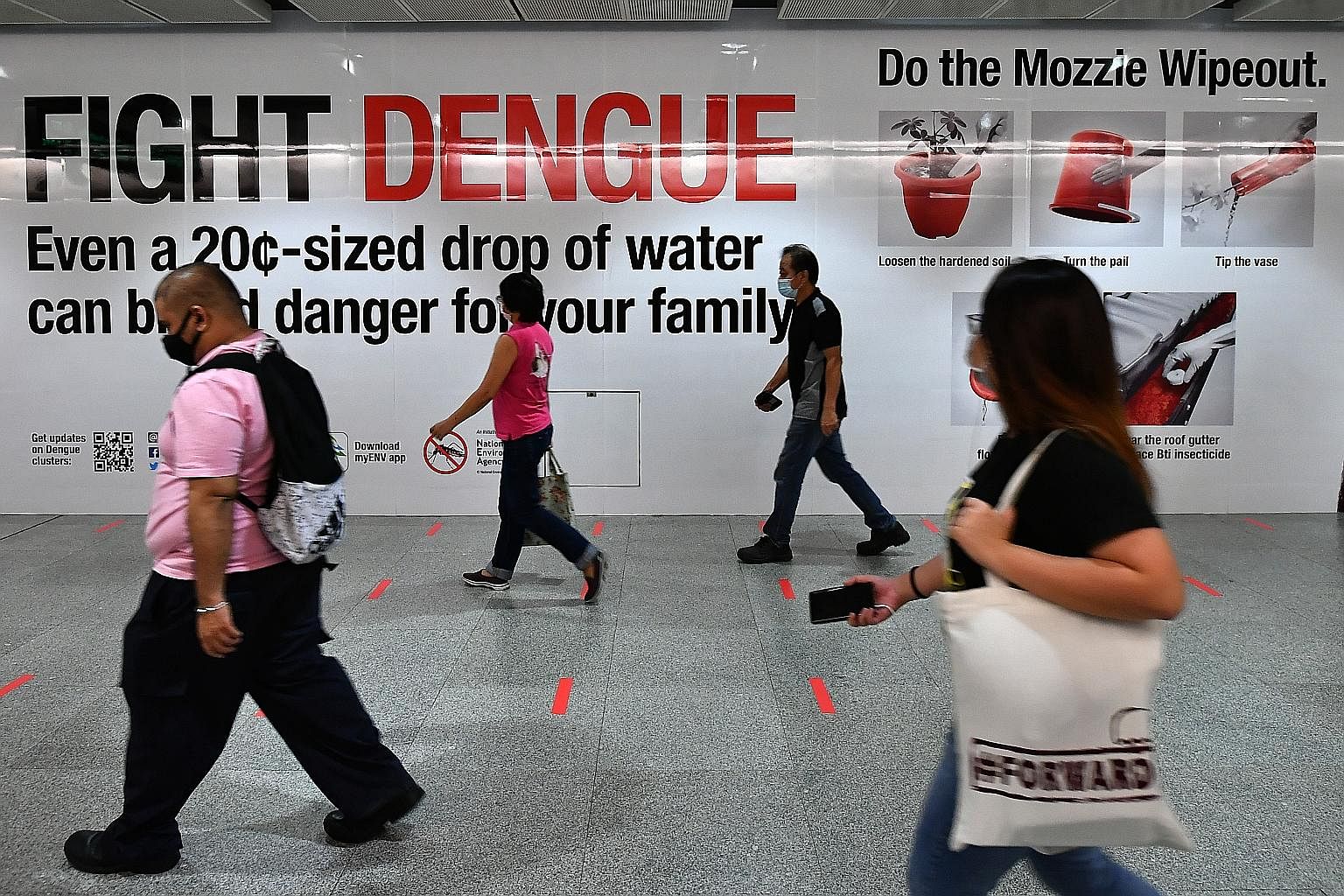As the Covid-19 pandemic engulfs both the world's attention and healthcare resources, less attention is being given to large disease outbreaks from a more familiar viral pathogen - the dengue virus.
Dengue cases, caused by the dengue virus, are being reported at an alarming rate from numerous countries in Latin America and Asia, including Singapore.
The National Environment Agency (NEA) has reported more than 7,000 cases of dengue here in the first 4½ months of this year, with more than 30 high-risk and 80 medium-risk clusters spread across the country.
The current dengue epidemic is explained by the shift in the most prevalent type of dengue (from type 2 to type 3) in a population with historically low immunity to type 3.
The situation could be further exacerbated by sporadic rainfall patterns in the coming months. If major actions are not taken to mitigate transmission, the number of dengue cases in Singapore this year is predicted to far exceed that last year.
CHALLENGES OF A DUAL OUTBREAK
Singapore's healthcare and public health systems are currently fighting two fierce battles - against the emergence of Covid-19 and the re-emergence of dengue.
To make matters worse, many of the early disease features, such as muscle and body aches, fever, fatigue and headache, overlap between Covid-19 and dengue.
This early similarity presents primary healthcare personnel with the challenging task of differentiating between the two infectious diseases.
In Singapore, two patients were mistakenly diagnosed with dengue, only to be later reclassified as Covid-19 patients.
As Covid-19 and dengue have distinct methods of transmission and require different containment measures, accurate diagnosis of the infectious virus is required to provide suitable care for patients and safety precautions for healthcare workers.
Although co-infections of dengue and Covid-19 have yet to be reported, the possibility of such co-infections occurring cannot be ruled out, and may pose a further challenge for healthcare settings.

Hence, with the immense focus and resources being allocated to controlling the Covid-19 pandemic, it is critical to remain vigilant when it comes to the diagnosis of dengue.
Dengue is a familiar enemy to Singaporeans, and thus we have a plethora of resources dedicated to combating the virus. However, facing a dengue outbreak under circuit breaker conditions presents a new and unique set of challenges.
Covid-19 control measures aim to contain a respiratory pathogen, while dengue is spread by mosquitoes, and respiratory control measures will not impact the mosquito vector. In fact, the unprecedented circuit breaker measures have halted most non-essential work and thus altered the social behaviour of the community.
As the majority of dengue clusters are found in residential areas, the increase in time that people spend at home, especially during the morning and early evening when Aedes mosquitoes are at the peak of their blood-seeking behaviour, raises the risk of getting bitten by dengue-carrying Aedes mosquitoes.
Therefore, during this circuit breaker period, the NEA has advised residents and workplaces to be extra vigilant and to implement strict vector control measures on their premises, including the removal of stagnant water and spraying of insecticide.
BEYOND THE CIRCUIT BREAKER
As the circuit breaker restrictions are set to ease after June 1, it is important to approach the future with caution.
The impact of the Covid-19 pandemic on dengue control efforts is yet unclear. For the immediate future following the circuit breaker, Covid-19 will rightly remain at the forefront.
As schools and workplaces are set to reopen, it is important that their premises be closely monitored for mosquito-breeding sites so that individuals can return to dengue-safe environments.
Additionally, employees have been urged to telecommute as much as possible to ensure safe workplaces, which means that a large proportion of the workforce will still be working from home.
Hence, those residing in dengue transmission clusters will continue to be at high risk of dengue exposure. As rain, warmth and humidity are forecast to increase in the coming months, the current upward trajectory of dengue cases is predicted to escalate. This is of concern as it is estimated that half the Singaporean population has never had a dengue infection.
Dengue type 3, the currently circulating virus, is the type most associated with disease during primary infection, thus the current outbreak is more likely to lead to severe cases.
Historically, dengue types 1 or 2 have been the dominant types found in Singapore, and are likely to return at some point in the future, as dengue outbreaks generally occur every two to four years. This presents further complications as a secondary infection by dengue type 2 is often associated with severe disease.
With dengue type 3 currently threatening severe disease from primary infections, and the likelihood of dengue type 2 returning with its attendant risk of severe secondary infections, it is clear that Singapore must not let its guard down in the fight against dengue.
While the dengue outbreak is currently overshadowed by the global magnitude of the Covid-19 pandemic, the size of the current dengue outbreak may set the stage for the severity of future dengue outbreaks in Singapore.
• Dr Ruklanthi de Alwis is a senior research fellow and Amanda Makha Bifani is a PhD student, both from the Emerging Infectious Diseases programme at Duke-NUS Medical School. Dr Chen Shiwei, a research fellow at the same institution, also contributed to the article.
